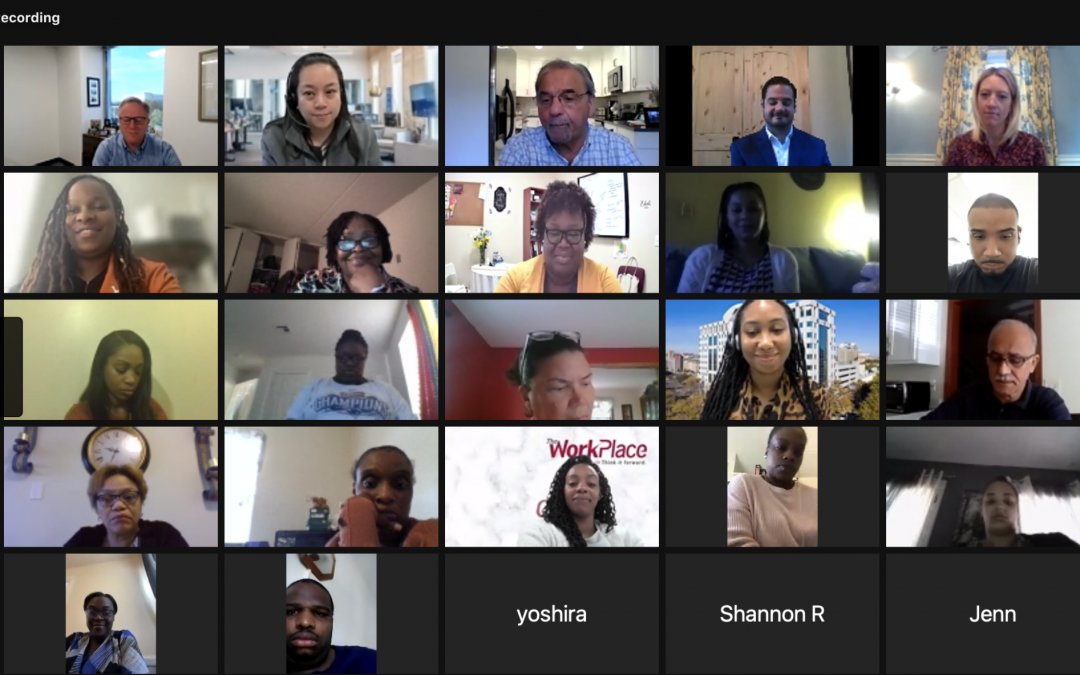CT Mirror. MARK PAZNIOKAS, OCTOBER 18, 2021
Connecticut is testing a belief that remote work will outlive the COVID-19 pandemic, presenting challenges and opportunities for a workforce that might lack digital skills yet benefit from telecommuting.
Twenty-eight unemployed men and women began an experimental workforce development program Monday that will teach skills necessary for remote employment and place them in paid internships.
While most of the program involves recorded classes over Google Classroom, it kicked off with a live one-hour orientation conducted, naturally enough, over Zoom.
Emmanuel Vega, wearing a black mask, watched over a smartphone from Central High School in Bridgeport, where he is learning the life skills necessary to live independently.
“I’m in a wheelchair,” he told the class. “I have spina bifida.”
Only 17.9% of persons with a disability were employed in 2020, down from 19.2% in 2018, according to a survey published early this year by the Bureau of Labor Statistics.
Joseph Carbone, who has worked on workforce development for 25 years with an entrepreneurial eye and evangelical zeal, said one of the disappointments of his career has been the inability to “get beyond those shameful numbers.”
He is the president and chief executive officer of The WorkPlace in Bridgeport, a regional job-training organization that is offering the remote-work class in partnership with Sacred Heart University.
About 17 years ago, Carbone said, The WorkPlace was one of three job-training agencies involved with a federal program to explore the demand for remote workers and the skills and habits necessary to make it work.
“It never went anywhere. And it never went anywhere because the market didn’t call for it,” Carbone said.
Carbone said employers have grown increasingly comfortable with remote work during the pandemic, and many companies are struggling to fill vacant jobs.
“So, this is the moment,” Carbone told the students. “This is the moment for us to make something out of this.”
It is being funded with $500,000 in federal CARES Act money administered by the state Office of Workforce Strategies, an agency created by the administration of Gov. Ned Lamont to better match training programs with employer demands.
“Joe is very creative,” said Kelli-Marie Vallieres, the director of the workforce strategies office. “He’s always looking forward.”
Vallieres said an appeal of the program was testing the notion of expanding opportunities for both persons with disabilities and workers left on the wrong side of the digital divide.
“It’s really important that we help people who have kind of been marginalized get back to work, and there’s a lot of people who have certain barriers to actually physically getting to a workplace every day,” she said. “And now that the world of work has really changed, our employers are starting to understand that their employees don’t have to physically be in a location to be very productive.”
Not only is remote work an opportunity for those who might be physically unable to work in a standard setting, but it can provide the ability to work off-hours and flexibility for a range of workers.
Carbone made a point of speaking at the orientation from his kitchen.
“I was going to do this from my conference room or my desk, and I thought, wow, why are you doing that? I mean, that defeats the purpose of the day, because this is about remote learning. This is about telework,” Carbone said.
Emmanuel Vega participated on his smartphone from school.
Carbone said he was one of those bosses who did not embrace remote work prior to the pandemic. Over 25 years, he guessed, he had approved telecommuting for maybe three employees, all for medical reasons.
But the pandemic hit as The WorkPlace was about to move to new offices.
“We operated in the world of technology, in cyberspace, for a period of three months. We didn’t have an office. We didn’t have a place to go,” Carbone said. “But our programs continued. We transitioned all of our programs within two or three weeks at the beginning of the pandemic into technology.”
Even those responsible for the program assured the students the pandemic has taught them all a few things about virtual learning and remote work.
“Throughout the pandemic, I had to learn from my 7-year-old son how to use Google Classroom as he was remote learning at home,” said Annie Suffredeni, a former corporate recruiter who will be the students’ contact at Sacred Heart. “It’s intuitive, it’s easy to use, and that’s where all of our assignments and our modules will exist.”
A module on resiliency developed by Sheryl L.W. Barnes, a life coach and employment consultant, is part of the curriculum.
Barnes is a consultant living the reality of making an income in the virtual world. Her significant book of training contracts with universities, non-profits and other clients all disappeared with the arrival of COVID in March 2020.
“And then one by one — this is what is interesting — one by one, every single one of those contracts came back, and I did them virtually,” Barnes said.
But she gave her first lesson when it was her turn to speak. She smiled and said, “Well, one of the things I’ve learned is to make sure I have unmuted myself.”

